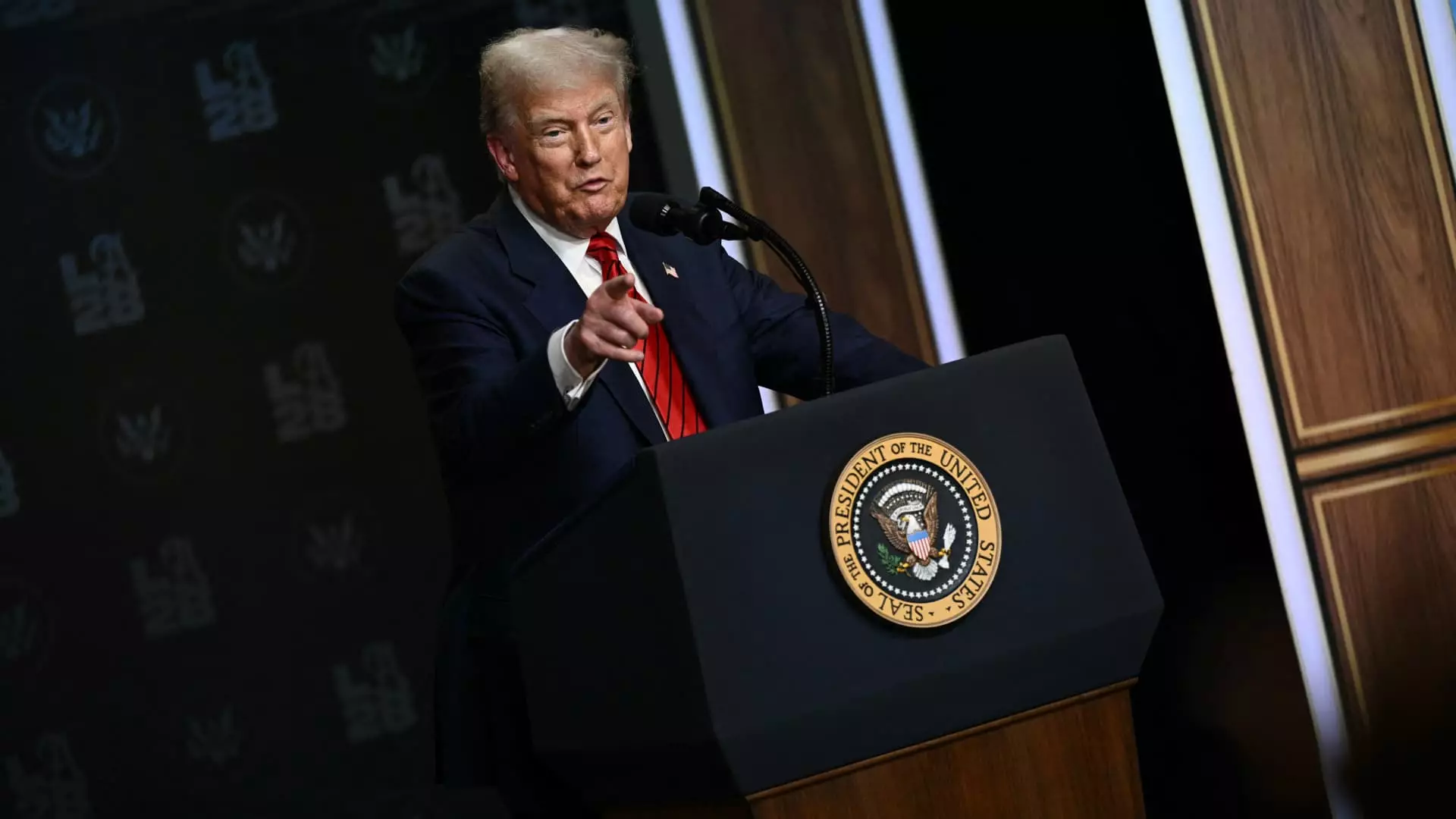In the realm of international diplomacy and economic negotiations, grand declarations often serve as strategic tools rather than genuine commitments. The recent announcement that the European Union pledges to invest an astonishing $600 billion into the United States may appear, on the surface, as a sign of renewed economic partnership. However, beneath this shiny veneer lies a murky reality of political rhetoric, conflicting interests, and uncertain follow-through. It’s essential to scrutinize whether this declaration is a meaningful step towards mutual growth or a calculated political move designed to placate a powerful leader, stock markets, and domestic audiences—yet ultimately destined to remain symbolic.
The framing by U.S. President Donald Trump portrays this investment as a gift or a “win,” implying that the EU is willingly handing over this vast sum. But when we dig deeper, it becomes increasingly evident that the promise is more vapor than vaporize. The EU’s commitment is a non-binding indication rather than a binding pledge, rooted more in political signaling than enforceable action. This gives the impression that, in international relations, the grand gesture often disguises a lack of concrete intent, especially when the actual mechanism of enforcement is absent.
The Reality of Unrealized Promises in a Politicized Sphere
The core issue at hand is whether the EU will follow through on its ambitious investment target. The European Commission’s vague statement about EU companies’ “interest” in investing $600 billion by 2029 hardly represents a firm, legally binding obligation. Larger political and economic realities undermine any confidence that this commitment will be fulfilled—especially considering the EU’s decentralized structure, where individual member states and private sector actors retain autonomy and financial independence.
Numerous factors threaten to frustrate this supposedly monumental influx of investment. Political priorities, domestic economic conditions, and the unpredictable winds of international trade policy make commitments on such a vast scale unlikely to materialize in full. Moreover, the timeframe—stretching to 2029—serves as a convenient buffer, allowing political leaders to avoid immediate accountability while stretching the narrative over multiple election cycles and political administrations.
In addition, the assumption that private sector companies will blindly invest large sums based solely on political promises is fundamentally flawed. Corporate decisions hinge on risk assessments, economic forecasts, and regulatory environments—not diplomatic declarations. As William Reinsch points out, investment decisions are complex and slow, especially in times of policy uncertainty, of which the current U.S.-EU relationship is rife.
Power Dynamics and Unspoken Leverage
The strategic implications of this investment pledge are complex. Trump’s framing suggests he’s wielding the promise as leverage, threatening tariffs or other economic penalties if the EU does not follow through. There’s a troubling undercurrent here: the potential use of economic pledges as bargaining chips rather than genuine commitments. This transactional approach to international diplomacy risks further destabilizing trust, as states engage more in strategic posturing than in fostering lasting partnerships.
The EU’s position is particularly vulnerable to such manipulation. Its inability to enforce its pledges reflects a fundamental weakness in the union’s collective economic power and political cohesion. With only “interest” and “intentions” on record, EU nations risk becoming hostage to the fluctuations of U.S. political will, especially considering the uncertainty looming after President Trump’s tenure ends.
Furthermore, this dynamic reveals a disconcerting aspect of modern geopolitics: the erosion of faith in multilateral agreements that lack enforceability. International commitments, especially those rooted in voluntary corporate actions, are increasingly superficial in a climate where national interests dominate. This fragile state of diplomatic trust underscores the shaky foundation upon which such grand economic promises are built.
Implications for Global Economic Governance
At a broader level, this situation exemplifies the challenges of global economic governance in an era driven by transactional diplomacy and populist rhetoric. When political leaders prioritize short-term gains—such as high-profile deals that look good in speeches—they risk undermining sustained, equitable economic development. The EU’s pledge, if unfulfilled, could signal a retreat from the kind of collaborative enterprise necessary to address complex global challenges like climate change, pandemics, and technological shifts.
From a center-wing liberal perspective, these pledges should be judged not only by their immediate economic impact but also by their compatibility with long-term, sustainable development, and respect for international norms. Rhetoric that hinges on promises unlikely to be realized weakens the credibility of diplomatic institutions and hampers efforts for genuine multilateral cooperation. Merely throwing a large number into the air as a symbolic gesture risks trivializing the real work of building equitable, enforceable agreements rooted in mutual benefit.
In essence, what we’re witnessing is a spectacle of political theatre—an elaborate dance that distracts from the hard questions about accountability, enforcement, and the true willingness of powerful actors to invest in shared prosperity. Until concrete mechanisms are established, and real commitments are made enforceable, the EU’s so-called investment pledge remains nothing more than a mirage—a fleeting promise unlikely to transform into tangible change.


Leave a Reply